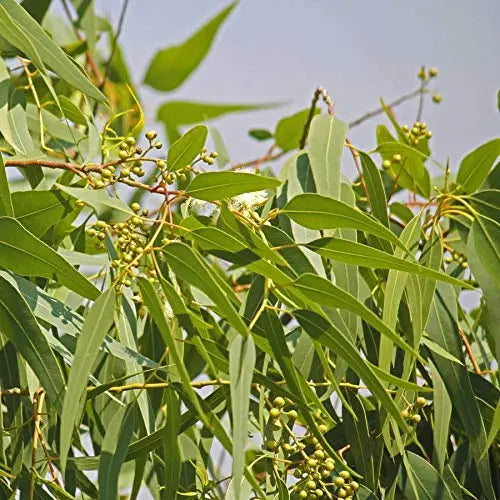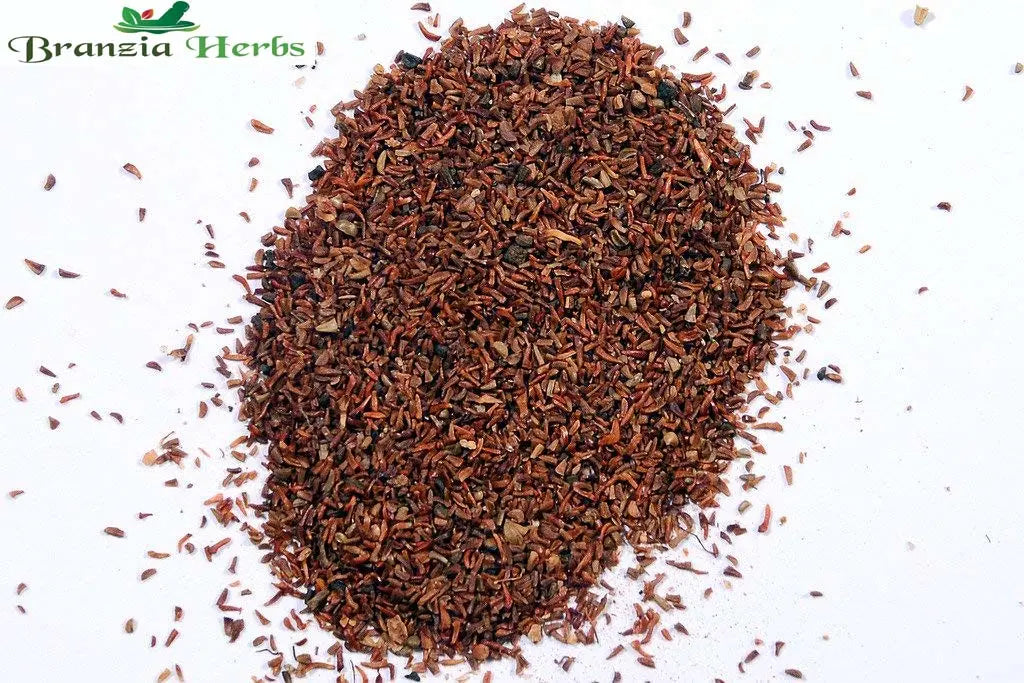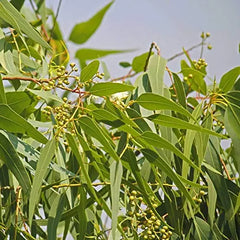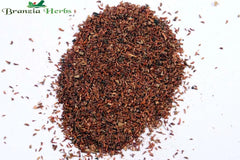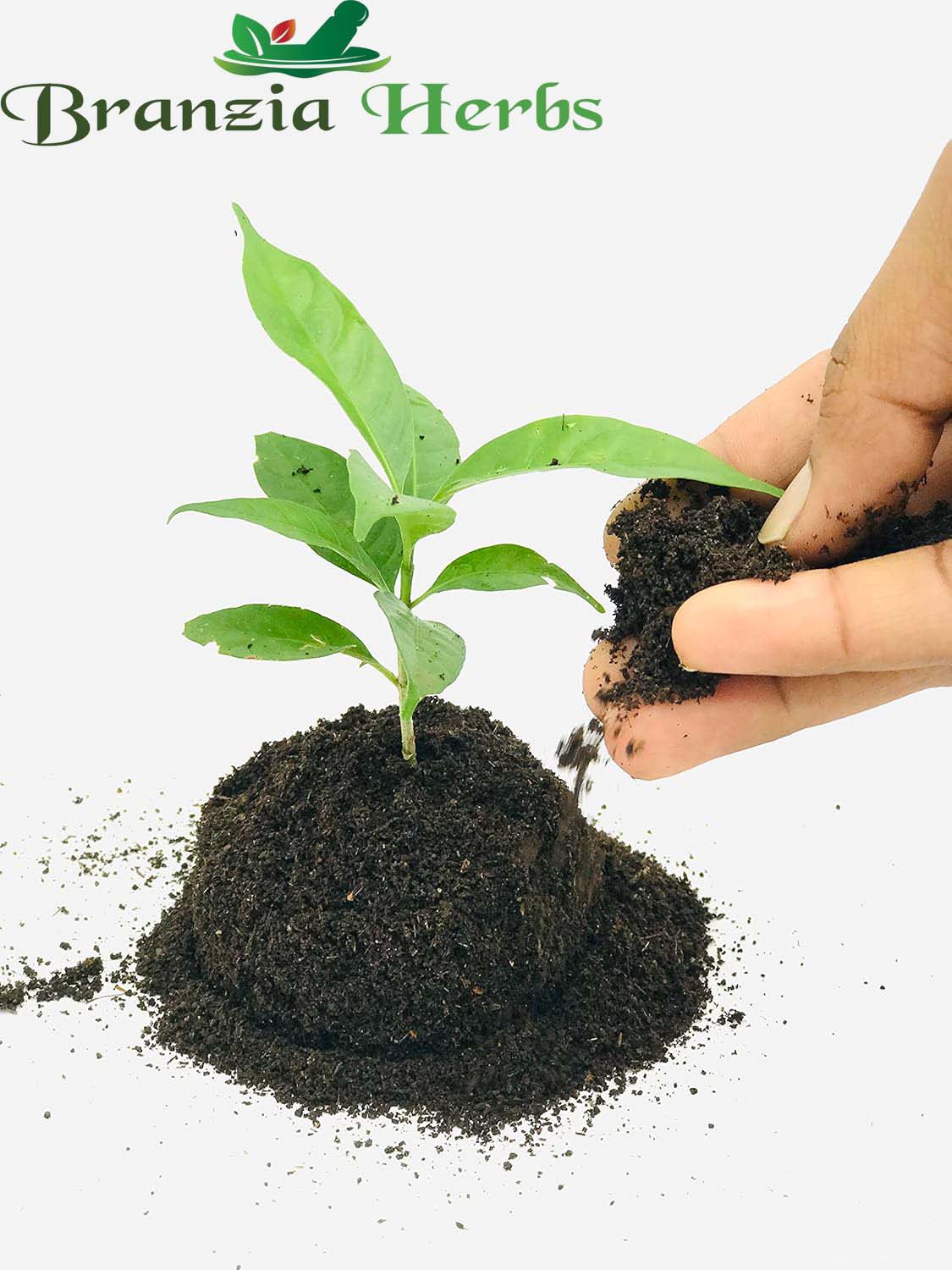Eucalyptus, commonly referred to as Nilgiri or Safeda, is a diverse genus of flowering trees and shrubs native to Australia, with various species cultivated around the world. These trees are valued for their fast growth, aromatic leaves, and practical uses. Here's a detailed guide on Eucalyptus tree seeds, including their characteristics, benefits, and planting care:
Characteristics
-
Appearance:
- Seeds: Eucalyptus seeds are small, often about 1-2 mm in diameter. They are typically brown or black and are contained in a woody capsule (fruit) that splits open when the seeds are mature.
- Fruit: The fruit is a capsule that becomes woody and opens up to release the seeds. It can be spherical or cylindrical, depending on the species.
-
Tree Size:
- Height: Eucalyptus trees can vary greatly in size, from small shrubs to towering giants reaching heights of 30-60 meters (100-200 feet), depending on the species.
- Canopy: They have a variety of canopy shapes, from narrow and columnar to broad and spreading.
Benefits
-
Economic Uses:
- Timber: Eucalyptus wood is used in construction, furniture making, and paper production due to its strength and durability.
- Essential Oils: Eucalyptus leaves are used to produce essential oils with medicinal properties, including anti-inflammatory and antiseptic benefits.
-
Environmental Benefits:
- Fast Growth: Eucalyptus trees grow quickly, making them suitable for reforestation and erosion control projects.
- Soil Improvement: They help in soil stabilization and can improve soil fertility through their leaf litter.
-
Ecological Benefits:
- Habitat: Provides habitat and food for various wildlife species, including koalas, which feed on eucalyptus leaves.
- Shade: Eucalyptus trees provide excellent shade due to their dense foliage.
-
Cultural and Aesthetic Uses:
- Landscaping: Often used in landscaping for their distinctive appearance and fragrant leaves.
- Ornamental Value: Their unique foliage and flowering patterns make them popular as ornamental trees in gardens and parks.
Planting Eucalyptus Seeds
-
Preparation:
- Seed Treatment: Eucalyptus seeds generally have a hard outer shell. Some species may benefit from scarification (light sanding or nicking) or soaking in warm water for 24 hours before planting to improve germination.
-
Timing:
- Optimal Season: Plant seeds in spring or early summer when temperatures are warm and conditions are favorable for growth.
-
Soil and Location:
- Soil Type: Prefers well-drained, loamy soil but can adapt to a range of soil types. Ensure good drainage to prevent waterlogging.
- Location: Choose a sunny location with full sun exposure. Eucalyptus trees thrive in tropical, subtropical, and temperate climates.
-
Planting:
- Sowing Seeds: Scatter seeds on the surface of the soil and lightly cover with a thin layer of soil or sand. Space seeds or seedlings about 10-15 feet (3-5 meters) apart to accommodate the mature tree size.
- Germination: Seeds typically germinate within 2-4 weeks. Keep the soil consistently moist but not waterlogged during this period.
-
Watering:
- Initial Care: Water regularly to keep the soil moist until the seedlings are established. Eucalyptus trees have deep root systems, so ensure deep watering.
- Ongoing Care: Once established, Eucalyptus trees are relatively drought-tolerant but will benefit from occasional watering during dry periods.
-
Fertilizing:
- Nutrients: Fertilize with a balanced fertilizer during the growing season to support healthy growth. Organic compost can also be beneficial.
Care and Maintenance
-
Pruning:
- Trimming: Prune young trees to shape them and remove any dead or damaged branches. Regular pruning helps maintain the tree’s structure and promotes healthy growth.
-
Pest and Disease Management:
- Monitoring: Eucalyptus trees are generally resistant to pests and diseases but should be monitored for issues such as fungal infections or insect infestations.
- Control: Use appropriate treatments if problems arise, following local guidelines.
-
Protection:
- Young Trees: Protect young trees from extreme weather conditions and pests until they are well-established.
Environmental Considerations
- Invasiveness: Some Eucalyptus species can become invasive in non-native areas, potentially outcompeting local flora. Monitor growth and manage accordingly.
Summary
Eucalyptus (Nilgiri/Safeda) seeds are valuable for their rapid growth, wood, essential oils, and environmental benefits. By following proper planting and care guidelines, you can successfully grow Eucalyptus trees and take advantage of their various uses and advantages in suitable climates. Ensure you select the right species for your local environment and manage the tree responsibly to prevent potential invasiveness.

